- Home
- Al Sarrantonio
The Orangefield Cycle Omnibus Page 6
The Orangefield Cycle Omnibus Read online
Page 6
“Dammit!” The handle slipped, slicing into his hand, but he ignored the pain, the quick line of blood, and kept pushing and banging.
The door gave a bit, but still wouldn’t open.
Buzzing filled his ears, an angry sound now — he realized that when he opened the door the hornets might rush out at him but he didn’t care. H drove the thought from his mind.
“Peter…”
The voice was growing fainter.
He shouted, and became aware that lights were going on around him — still he beat at the handle.
The door gave way another fraction; it was almost open—
“Jesus! Open, dammit!”
With a supreme effort, which caused the broken metal handle of the spade to push painfully into his open wound, the door opened with a huge groaning creak and flew back on its hinges.
“Ginny!”
“Peter…”
There was darkness within, a seething fog of flying things — and then something stumbled out into his arms, something white and alive, a human skeleton with a skin made of hornets. Writhing alive orange and black insects covered her skull, her arms, her fingers which gripped him tightly as he stumbled backwards screaming in its embrace. The thing walked with him, holding him tightly, hornets making Ginny’s face, boiling alive in the empty eye sockets to make eyes, and hair, and lips on the skeletal mouth.
The mouth moved, the opening jawbone hissing with the movement of hornets. The writing face showed something that was almost tenderness.
“Kiss me, Peter. Kiss me…”
He screamed, pushing at the thing which would not let him go, aware suddenly that there were others nearby. He turned his head to see Detective Grant and the beekeeper Willims standing side-by-side, rooted with horror to the spot they stood in, flashlights trained on him.
“Kiss me, Peter. Samhain let me come back. The Lord of the Dead let me come back, but only for a little while. I never stopped loving you…”
The thing covered in hornets turned and looked straight at Detective Grant. There was a sudden hard look to the writhing features.
“Samhain says something is coming. He says stay out of it. If you don’t, he will kill your wife and everyone close to you.”
And now Peter felt the first stings as the hornets began to peel away from Ginny’s skeleton, covering his own face, attacking him—
“Help me!” he screamed.
Ginny melted away in his arms, the bones collapsing to a clacking pile as Peter fell to the ground, covered in angry hornets. Through his burning eyes he saw the beekeeper standing over him, wide-eyed, waving his arms, his flashlight beam bouncing, shouting something which Peter could no longer hear through his swollen ears, his screaming mouth filled with soft angry hornets, his throat, his body covered inside his clothing.
He gave a horrid final choking scream, and was silent.
Chapter Thirteen
“And that’s the way you’d like the record to read?” District Attorney Morton said. He was shaking his head as he said it — but then again, he had been shaking his head since the informal inquest had begun two hours ago.
Detective Grant spoke up. “This will be sealed, right?”
Morton laughed shortly, a not humorous sound. “You bet your ass it will be. We’re lucky nobody from the press got wind of this.” He looked sideways at the beekeeper. “We’re not going to have any trouble from you, are we, Mr. Willims?”
The beekeeper nearly gulped. “Are you kidding? If Detective Grant hadn’t been standing next to me, do you think the bunch of you would even be listening to me? I’d be in a looney bungalow right now.” He turned to face Grant. “Tell them what that thing told you. The message from Samhain it gave you.”
Tight-lipped, Grant said nothing.
Morton kept his eyes on Willims. “Yes, Mr. Willims, without Detective Grant you would now be in a straight jacket. Especially since you’re the only one making all these claims about ‘Samhain’ and such. But since the two of you saw this strange killing take place —”
The beekeeper gulped again, and Grant nodded curtly.
“At least I don’t think Kerlan killed his wife,” Grant said. “It looks to me like she got herself stuck in that gardening shed, and the hornets got to her.” He looked at Willims, and suddenly everyone was looking at the beekeeper.
“You want me to tell you this all could happen? Sure, I’ll tell you — but I still don’t believe it. Could hornets strip a human body clean in a few days? Well, maybe. Usually hornets won’t eat human flesh, but if the opportunity presents itself, I guess they might. They probably stung her to death after she got trapped in the shed. And then the body was in there with them…so, sure, I guess it could happen.”
“And what about the supposed…” Morton consulted the papers before him. “…mobility of the skeleton…?” He let the question hang, and Grant finally spoke up.
“The damn thing looked like it stumbled out of the shed. But it could have been a trick of the light. If the skeletal remains had been propped against the door when Kerlan opened it, which would have been consistent with his wife’s trying to get out of the shed until she was overcome by the hornets, then, sure, it could have tumbled out into his arms.”
He looked over at the beekeeper, who looked at his shoes. “Yeah, I guess that’s what I saw too.”
Morton addressed the beekeeper: “And the bees covering Mrs. Kerlan like skin — that could have been a ‘trick of the light’ too?”
“Well…”
Willims looked up from his shoes to see Grant glaring at him.
“Sure, I guess so. And I guess the words we heard her say could have been in our minds —”
For a moment he looked defiant, before collapsing. “All right. It was all in our heads.”
“Fine,” Morton said. He had gained a satisfied look. He turned to the medical examiner. “Jim, you’re okay with the cause of death in both cases as being extreme toxic reaction to hornet stings?”
The M.E. nodded once.” “Yep.”
“And there was nothing the two of you could have done to save him?” he asked Grant and Willims.
The beekeeper said, “By the time we got to him he’d already been stung hundreds of times. I was able to get some of them off, but it was too late. The weirdest thing is that they wouldn’t respond to light, which threw me. When I shined my flashlight on them they should have flocked to it.”
“But they could have been so angry at that point that they would have ignored the light, correct?” Morton said sharply.
“I guess so. But I still say they should have attacked the light, and left Mr. Kerlan alone.”
“But you’re fine with the way we wrote it up in the final report?” Morton said, daring the beekeeper to contradict him.
“Yes, I suppose so.”
“Good. Anything else?” Morton patted his knees, making as if to rise, daring anyone in the room not to let him end the proceedings.
There was a glum silence. Once again the beekeeper was staring at his own shoes.
“I want to re-emphasize, Mr. Willims, that you aren’t to speak to anyone of what went on in here today. We’re all sworn to secrecy. This record will be sealed. Whatever was said in this room remains in this room. I don’t want to see anything in the newspapers about humans made out of yellow jackets or…” here he consulted his notes again, “…Samhain, the Lord of the Dead. You understand?”
Without lifting his gaze, Willims answered, “Sure.”
Letting a hard edge climb into his tone, Morton said, “If any of this finds its way into the press, or anywhere else outside this room, I’ll know who to call on, won’t I, Mr. Willims?”
The beekeeper nodded. His gaze shifted momentarily to Grant, whose face was blank.
“Just so you understand,” Morton continued. “There are licenses and such in your profession, and I would hate for you to have trouble in that area.”
The beekeeper nodded again.
Morton�
��s tone switched suddenly from hard to hearty. “All right, then — that’s it!” He stood and stretched, glancing at the M.E. “Jim — lunch?”
“Yep,” the M.E. said.
The rest of them rose, and as Grant passed Willims he leaned close and whispered sharply, “We both know what really happened. I’ll take care of it.”
On the way out of the room the District Attorney put his arm briefly around the beekeeper’s shoulder and said, “Just forget about it, Willims. Chalk it up to professional strangeness.”
Willims looked up at the D.A., and for a moment his face was haunted.
“The thing I can’t get over,” he said, “is the stuff she was saying about the Lord of the Dead, how she’d been brought back from the dead —”
Morton’s scowl turned to an angry frown. “I warned you in there, Willims—”
“I heard you,” the beekeeper said resignedly. “Believe me, I heard you.”
Morton removed his arm from the other man’s shoulder, giving him a slight shove forward. “Just don’t forget what I said.”
They were in the marbled hallway of the court building, leading toward the revolving doors to the outside world. Morton watched Willims go through them, slouching with unhappiness.
The M.E. came up behind him and tapped him on the shoulder.
“Meet you at the restaurant,” he said laconically. “I’ve got to dip into my office upstairs for a minute.”
“Fine.”
The M.E. peeled off into another hallway, his footsteps echoing away on the polished stone floor.
After a moment, the D.A. composed himself into his public face of smiling bluster, and drove through the revolving doors.
Outside it was cold and bright, early November chill making the recent October heat wave a memory.
The D.A. shivered, wishing he had remembered his topcoat. But the restaurant was only a block away.
He began to descend the wide stone steps of the courthouse, which led to the street, when something small and striped orange and black, an insect, brushed by his ear and settled lightly there.
He heard the faintest of whispers before he swatted it away — as if someone were talking to him from a far distance. Later, until the voice came again and he was sure, he would wonder if he had heard it at all:
“I may want you to do something for me…”
Part Two
False Leads
Chapter Fourteen
Perhaps it was the wind that first brought him to the town of Orangefield, a wind that made leaf tornados, dervishing colors from denuded trees. Or perhaps it was the chill in the air, the first cold tendrils of coming winter that were Autumn. Or perhaps it was the children bedecked in autumn — or the windows with cutouts, or the pumpkins, wet and cold sweet inside, orange, firm and smiling on the outside. Or the season, or the fact that the town had briefly been called Pumpkinfield.
Or perhaps it was because he needed somewhere to serve his Master.
Or maybe it was the special evening that would soon be here.
His evening.
There are many ways to skin a cat.
Yes, the other voice answered. Indeed. But I am becoming tired of your failed efforts.
This Halloween will be different. I feel the power within me for this. This time I will succeed.
And then? the other voice asked.
And then everything. And I will give it over to you, Dark One.
Do you really think you can do it directly? Without passing through that… other place?
I feel powerful. As powerful as ever.
You’ve said this before.
This time I have three sure ones to help me. The girl Wizard and two others. And…
And?
I have what you might call… insurance.
But if, like the last time, one of them fails—
Everything will succeed.
We shall see.
There is only one problem, and it will be solved soon. This man Grant, this detective, there is something about him…
You can handle him?
Not in the usual way. He is one of the strong ones, unlike Kerlan, who was disrespectful, and weak. Grant must be pushed aside.
Do it, then.
It will be done. I am only your servant.
True words. A servant without a choice. I will watch your progress with interest, Samhain.
The voice laughed, a mirthless sound as cold and dead as space.
Or should I call you Sam?
Chapter Fifteen
Jody Wendt, five years old, saw the Pumpkin Boy through the window over the kitchen sink, outlined against the huge rising moon like a silhouette against a white screen. Jody had climbed up onto the counter next to the basin to reach the cereal in an overhead cabinet. Now he stood transfixed with a box of corn flakes in his hands, mouth agape.
The Pumpkin Boy had a bright orange pumpkin head with cold night steam puffing out of the eyes, nose and mouth cutouts, and a body consisting of a bright metal barrel chest and jointed legs and arms that looked like stainless steel rails. Even through the closed window Jody could hear the creaking noises he made. He moved stiffly, like he was unused to walking: his feet were two flat ovoid pads, slightly rounded and raised on top, made of shiny metal. As Jody watched, one of the feet stuck in place in the muddy ground; the Pumpkin Boy, oblivious, walked on, and then toppled over with a sound like rusting machinery. He lay on the ground like a turtle on its back, making a hollow chuffing noise like Saaaafe, saaaafe, saaaafe. Then he slowly righted himself, rising to a sitting position and then turned slowly to search for his lost foot. Finding it, he fell forward and clawed his way toward it. He closed his hands around it. His head fell forward and hit the ground, rolling away from the body, and the hands immediately let go of the foot and grabbed the head, realigning it on the stilt body with a ffffffmp.
Then the foot was reattached to the leg and the Pumpkin Boy stood up with a groaning, complaining metal sound.
The Pumpkin Boy reached back down, creaking loudly, to pluck two fat organic pumpkins from Mr. Schwartz’s field that grew in back of Jody’s yard, and began to move off, away into the night.
“Wow….” Jody whispered against the window pane, making it fog. He quickly cleared it with the cuff of his shirt, and watched the Pumpkin Boy stiffly climb the fence that bordered Mr. Schwartz’s pumpkin patch from another behind it. In the process the Pumpkin Boy lost hold of one of the pumpkins he held but paid no heed.
“Wow…” Jody whispered again.
Jody was alone in the house; it was the half hour in-between-time when the afternoon sitter went home and his mother came home from her job in town.
He had been told repeatedly that he was not to leave the house during in-between-time.
The forgotten box of corn flakes lay spilling cereal into the kitchen sink as he climbed down, pushed his arms into his jacket and opened the door which led from the kitchen to the back yard.
As Jody Wendt stood on the top step of the back stoop, the storm door closing with a hiss-and-bang behind him, he saw the Pumpkin Boy once again outlined against the moon, but moving quickly away. He was already two fields over, and would soon drop behind the slope that led down to Martin’s Creek and the valley beyond.
Mouth still open in amazement, Jody was working at the zipper to his jacket, which wouldn’t zip. His feet were already carrying him down the steps, across the yard, to the split-log fence.
He dipped under the fence, forgetting the zipper, and stood in Mr. Schwartz’s pumpkin patch on the other side.
The Pumpkin Boy’s head was just visible, and then the slope down made him disappear.
Jody hurried on.
Mr. Schwartz’s pumpkin field was furrowed, bursting with fat vined pumpkins ready to be picked and sold for Halloween. Jody tripped over the first row he came to, and landed on his hands.
He found himself face to face with a huge oval orange fruit, its skin hard and strong.
It looked l
ike a human head.
Jody pushed himself up and stumbled on.
He fell twice more. But still, in the distance, he could hear the metallic creaking sounds of the Pumpkin Boy. There were two more fences to manage, one again of split logs which Jody scooted under and the other of chain link, which he climbed with difficulty.
He nearly toppled over when he reached the top, but then, in the distance, he saw an orange flash in the moonlight: the top of the Pumpkin Boy’s head. He held on and descended to the other side.
There was a rock wall, which Jody had never known existed, separating two more pumpkin fields.
Jody was now in unfamiliar territory. Even from his bedroom window, just before harvest, the fields surrounding his house were awash in taut orange fruit, and now, for the first time, he knew just how complicated the layout was.
At yet another rock wall he paused to look back. He could no longer see his house.
He heard a sharp metallic creak in the far distance, and hurried toward it.
The pumpkin field ended in a tangle of weeds and brambles and a ledge. Abruptly, Jody found himself teetering at the top of the slope. A tuft of brambles caught his foot and twisted his ankle and, with a short surprised gasp, he was tumbling down the damp, soft bank.
At the bottom, he came up short against an uprooted oak trunk, and came to a stop with one of its gnarled roots pointing into his face like an accusing finger.
He sat up, soiled and wet.
Suddenly, he realized what he had done.
He looked back, up the slope, and shuddered with the thought that, even if he could climb the steep incline, he would not be able to find his way back home through the tangle of pumpkin fields.
A quick, hot shiver of fear shot up his back.
But then: in front of him, like the sound of the pied piper’s flute, there came the creaking sound of the Pumpkin Boy moving. The pumpkin head flashed through the trees, and Jody forgot his fear. His wonder renewed, he stood and ran after it.

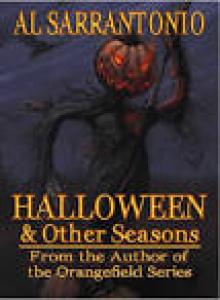 Five World Saga 01 Hornets and Others
Five World Saga 01 Hornets and Others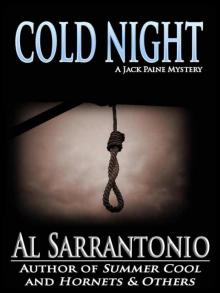 Cold Night (Jack Paine Mysteries)
Cold Night (Jack Paine Mysteries)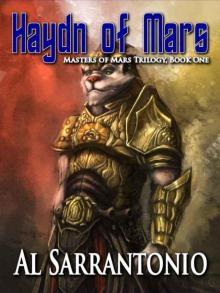 Haydn of Mars
Haydn of Mars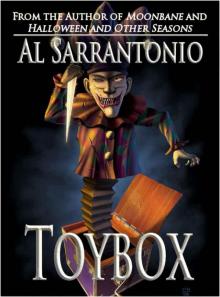 Toybox
Toybox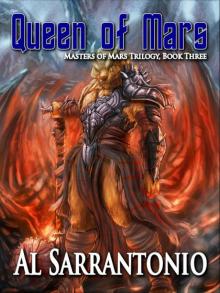 Queen of Mars - Book III in the Masters of Mars Trilogy
Queen of Mars - Book III in the Masters of Mars Trilogy Exile
Exile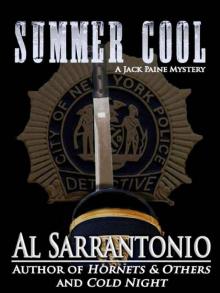 Summer Cool - A Jack Paine Mystery (Jack Paine Mysteries)
Summer Cool - A Jack Paine Mystery (Jack Paine Mysteries) Return - Book III of the Five Worlds Trilogy
Return - Book III of the Five Worlds Trilogy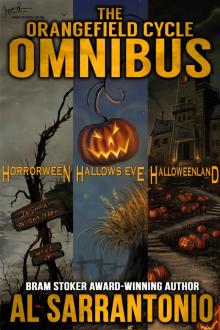 The Orangefield Cycle Omnibus
The Orangefield Cycle Omnibus Summer Cool jp-2
Summer Cool jp-2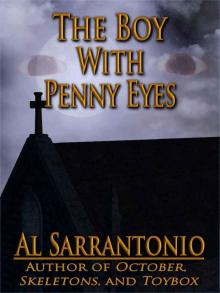 The Boy With Penny Eyes
The Boy With Penny Eyes Journey - Book II of the Five Worlds Trilogy
Journey - Book II of the Five Worlds Trilogy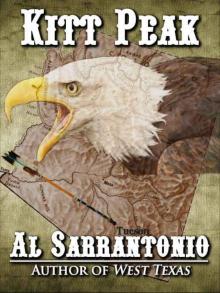 Kitt Peak
Kitt Peak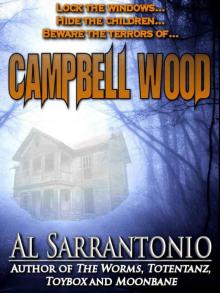 Campbell Wood
Campbell Wood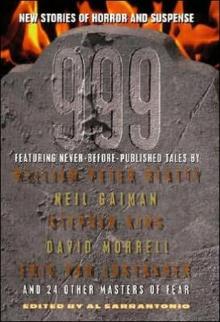 999
999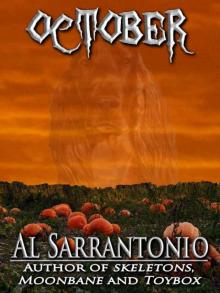 October
October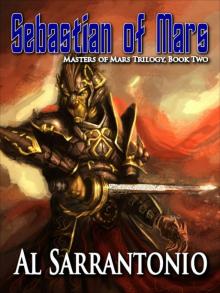 Sebastian of Mars
Sebastian of Mars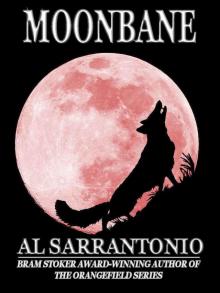 Moonbane
Moonbane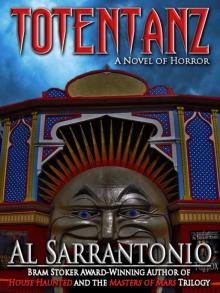 Totentanz
Totentanz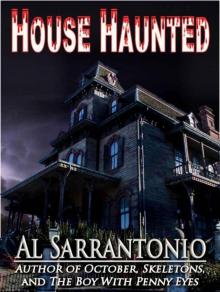 House Haunted
House Haunted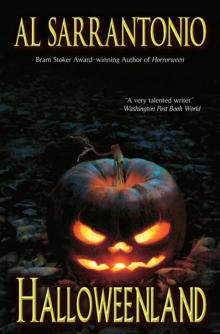 Halloweenland
Halloweenland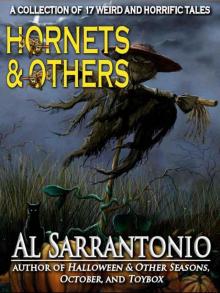 Hornets and Others
Hornets and Others